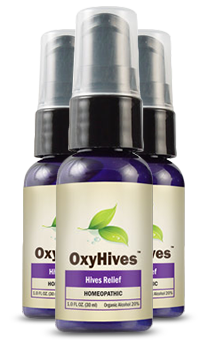 We suffer from various medical conditions.
We suffer from various medical conditions.
Some of these conditions can be resolved through treatment that gives a permanent cure while others, unfortunately, reoccur after undergoing initial treatment for the condition.
Urticaria is one of such medical conditions, where recurring hives that come and go daily can be really torturing and adversely affect your quality of life.
So what are the causes, treatment options, and thing you should do to get rid of this nightmare?
Understand Different Types of Hives: Causes and Symptoms
Hives manifest as reddish bumps on the skin. They usually cause an uncomfortable itch when they appear on the skin in patches, while a patch of hives comprises of welts of different shapes and sizes. Hives can appear anywhere on your body.
According to MedicineNet and WebMD, hives have been classified into 3 distinct categories on the basis of the time they have been present, and how they manifest on the patient:
Type #1: Acute Urticaria
This is a case of hives where the patient suffers the symptoms for less than 6 weeks. It is caused by allergic reaction to some foods, drugs, and infections.
Medical studies have shown that some individuals are prone to hives when they eat foods like nuts, chocolates, fish, tomatoes, eggs, fresh berries, and milk. Foods eaten fresh and raw have more tendencies to cause hives than foods that have been cooked, whilst hives patients have also reacted to certain additives and preservatives used for foods.
A patient can be diagnosed with acute urticaria if their medical records show a history of this ailment or after a proper medical assessment has been carried out.
Type #2: Chronic Urticaria
A case of hives that persists more than 6 weeks is termed chronic urticaria (and Angioedema). In this case, the patient can suffer symptoms for many months and even years.
Patient UK revealed that chronic urticaria tend to come and go. What is usually noticed in this case is that a case of hives might last for a few weeks and disappear only to reoccur after a while, or it never goes away. Patients have reported that the hives appear on one particular part of their bodies or different parts of the body.
Chronic hives are easy to diagnose because of the obvious symptoms and the familiarity of doctors with the ailment but the cause still eludes medical research. It has been linked with many serious health conditions like lupus, hepatitis, thyroid disease and even cancer.
A protracted case of chronic urticaria and angioedema has been known to hinder the normal functions of certain body organs like lungs, digestive system, and the muscles. Basic symptoms to watch out for are irregular breathing, sore muscles, irritation, diarrhea, and vomiting.
There is another rare case of hives known as Chronic Idiopathic Urticaria (CIU). Patients who suffer from this condition experience breakout of hives as frequent as every 24 hours. The symptoms last for about 24 hours before disappearing, only to reoccur in about 6 weeks. It is very rare, and predominantly affecting patients aged between 20 years and 40 years.
Claudine Landolt shares her chronic hives experience in video below, and how she lived with it.
Type #3: Physical Urticaria
There are patients that experience a breakout of hives when their skin is exposed to conditions like cold, heat from the sun, sweat or when the patient undergoes a strenuous exercise. These hives caused by direct physical stimulation of the skin are known as physical Urticaria.
These patients can also suffer a breakout when certain parts of their skin are physically stimulated with the fingers. Cases of dermatographism have been classified under physical urticaria; the peculiar feature of this condition is that it has been noticed to occur with other forms of hives causing the patients in this condition to suffer great discomfort.
How To Treat Recurring Hives That Come and Go Daily?
In cases of recurrent hives, the medical doctor will first seek to detect the presence of an underlying ailment which might be more serious than hives. Recurring hives is usually a symptom that a more serious health condition like thyroid disease, lupus or even cancer is developing in the patient’s body.
Patients who suffer from severe itching are given over the counter antihistamine drugs to reduce the itchy discomfort. The dosage is usually for the antihistamine to be taken daily.
Antihistamine drugs have a reputation of causing drowsiness. However, the later products have been developed to have lesser side effects like drowsiness or irritation. These include newer versions of antihistamine like Loratadine (Claritin, Alavert), Fexofenadine (Allegra), Cetirizine (Zyrtec), Levocetirizine (Xyzal), and Desloratadine (Clarinex).
These medications might not be effective in every case. If you find that the antihistamine drug prescribed for you is not working as effectively as it should, please inform your doctor. Further tests and observations will be conducted to find a suitable drug to relieve you.
In cases where the more potent forms of antihistamine that are likely to make you drowsy are prescribed, the indications will state that the drug should be taken just before bedtime because it causes drowsiness. Examples of these stronger antihistamine drugs are Hydroxyzine (Vistaril), Diphenhydramine (Benadryl), and Chlorpheniramine (Chlor-Trimeton).
Steroids have also been included in the prescribed drug combination used to treat hives. In this case, it will be used in minimal quantities for a short period of about 5 days to 2 weeks.
One natural over the counter options to help get rid of hives fast is homeopathic remedy as a complementary or alternative medicine (CAM) for hives treatment.
Homeopathy, a medical practice and alternative medicine based on the idea that the body has the ability to heal itself, was founded in 1796 by Samuel Hahnemann in Germany and has been widely practiced nowadays after gaining popularity over the years.
 A leading OTC homeopathic hives relief product is Oxyhives. It contains all-natural ingredients like Apis Mellifera (honey bee) and Arnica Montana flower that have been used for decades as natural medication to cure hives.
A leading OTC homeopathic hives relief product is Oxyhives. It contains all-natural ingredients like Apis Mellifera (honey bee) and Arnica Montana flower that have been used for decades as natural medication to cure hives.
Once applied to skin, the natural ingredients contained in the Oxyhives topical homeopathic solution will provide instant relief on intolerably hives symptoms by fighting against itchiness, pain, irritation, redness, and swelling.
>> Visit Oxyhives official website here to learn more
Medical Procedures Used to Diagnose Your Hives?
The irregular nature of hives makes sit quite difficult for a proper diagnosis. The major cause of hives is still unknown considering a large sample of patients with varying symptoms and suspected triggers.
With the exception of chronic hives, many patients pay little attention to a hives breakout because it doesn’t last for long.
Physical examination remains one of the common methods used to diagnose hives; other cases might require tests to be run on the skin and collected tissues. This usually reveals useful information in cases where the patient suffers from recurring hives.
Doctors can carry out more effective investigation by asking detailed questions to find out why patients suffer from chronic hives. This will most likely reveal the common triggers of hives and the patients will be advised to make a conscious effort to avoid these triggers.
The following information will lead a useful investigation –
- Your daily routine (including tasks, errands and places you visit).
- A breakdown of foods you eat regularly.
- The common parts of your body where hives appear most.
In the excellent video below, Dr Dantini shares his insights on diagnosis and treatments of various Urticaria types, including how to get to the root of the problem for this skin disease.
Antihistamine drugs might have side effects that will negatively affect pregnant women or nursing mothers. Doctors will also inquire if you are on any other medication that might react negatively with these drugs before prescribing them.
If you experience any of symptoms below alongside a hives breakout, you must seek medical attention for a comprehensive medical assessment:
- Feeling dizzy.
- Wheezing while breathing through the nose or mouth.
- Breathing difficulties.
- Discomforting tight feeling in the chest region.
- Swollen tongue, lips, or parts of the face.